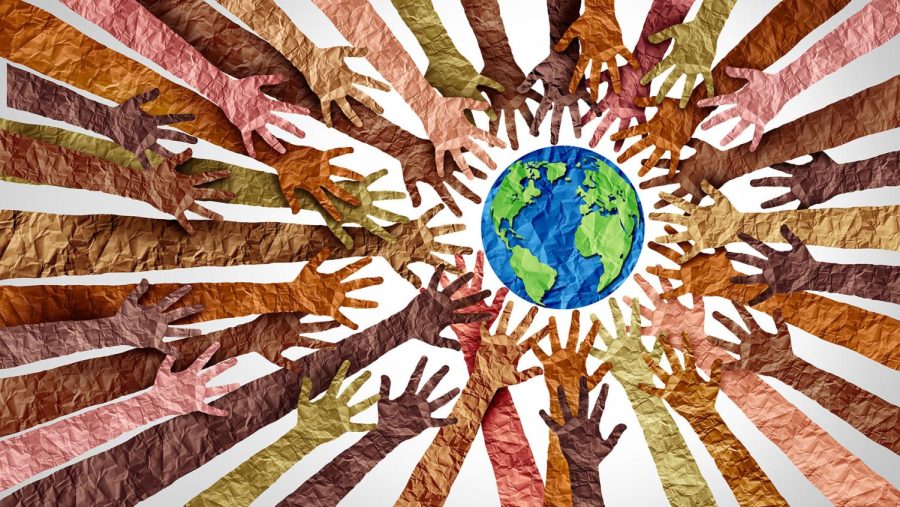Opinion | The dangers of being a climate change denialist during COVID-19
We cannot stay comfortable with the short-lived environmental benefits during the beginning of lockdown.
March 6, 2022
“Greenhouse gas emissions plummet during lockdown!”
“Air, noise, and water pollution decrease!”
“The wildlife is coming back!”
During the beginning of COVID-19, these silver linings reported in the news cycle offered a happy distraction from the tragic state of the world. However, these headlines and environmental “benefits” were happening well over two years ago.
Now that we’re in 2022, it’s time to recognize the dangers of believing the pandemic has helped the environment.
COVID-19 is an ongoing problem — the understatement of the year — but we must understand that our lives have been at risk long before the initial outbreak of climate change.
We live in a world of denial. Before the unfortunate wave of anti-vaxxers and those with consistent disregard for the dangers of the pandemic, we saw climate change denialists.
Denialism is a state of avoiding unfortunate truths. One of the most unfortunate truths to face is that we have been destroying resources, habitats, and ultimately the future of our planet for a long time. Because of this, we are in danger.
Even if one does not believe in climate change, it is happening. Glaciers are still melting, sea levels are rising, resources are depleting, organisms are dying, and therefore so is our planet.
Although we experienced the slowing-down of human activity during lockdown, therefore a short period of reduction of environmental ruin, we must ask ourselves if we have adopted even worse personal habits that increase resource degradation.
Over the last few years, we have reintroduced single-use products into our lives. From take-out meal containers to disposable masks, the reemergence of single-use plastics leads to litter.
“Our habits changed to a delivery-reliant service economy and high needs of certain personal consumption of electricity, certain goods, and clearly types of services,” Associate Professor of Instruction in the Rhetoric Department Will Jennings wrote in an email to The Daily Iowan.
If you go for a walk, odds are you’re going to step over a mask or two. Especially in Iowa City, where the university-provided protection litters the campus.
While these one-and-done products are necessary for reducing the spread of COVID-19, their presence also allows for the worst habit of all: ignoring climate change.
“While incidental usage changes (higher disposable masks, plastic utensils, takeout packaging, etc.) are more immediately visible — just walking the streets of town and observing littered masks and plastic bottles, none of this changes the likelihood of a terrifying fire season in the American West, life-threatening floods in parts of the US, Europe (Germany in specific), sea rise and a significant increase in Climate Change Refugees,” Jennings wrote.
The masks and take-out litter aren’t the problem, rather it’s their ability to captivate and remove attention from the bigger climate issues that exist.
What really needs to change is our reliance on carbon-based energy, habitat destruction, and overall denial of the fast-approaching fury of climate change.
But it’s easier to focus on smaller eco-crises.
Why do you think we are trying to save the turtles from cutting back on straw usage instead of approaching the fact that entire oceans are warming?
The short span of positive environmental benefits has distracted our attention from the major issues. Articles of trash littering the streets are not what is going to hurt us in the long run: rather varying extreme weather patterns derived from climate change like flooding, fires, heat waves, and more.
“So, the COVID-related blip is worth noting, but should not distract us from the urgency of the climate threats we and other species face in the present tense,” Jennings wrote.
“I’m not trying to sound off the dooms-day alarm. I’m just saying that we can’t get comfortable just because there was some good news at the beginning of the pandemic.
The breath of fresh air of improvement a few years ago was only that: a breath.
However, mindful actions are better than no actions. There is power in any form of progress.
So, continue to act sustainably on an individual level: reduce waste, reuse what you can, and recycle-but don’t let these small successes distract you from the actual state of climate change and the task we have at hand.
However, instead of denying major climate issues, we can apply valuable lessons learned from our actions during the pandemic.
Much like our power to mitigate the spread of COVID-19 through hand washing, wearing masks, and getting vaccinated, we have the power to take responsibility on behalf of the environment.
Like the burst of community consciousness for ensuring our neighbors stay healthy, we need to work together to ensure the health of our earthly community.
Most importantly, we collectively need to continue to learn and have a hunger to change our immediate situation.
“The importance of linking consumption-production to carbon and other climate changing human inputs should catch our attention and support assertions of what we do have impact,” Jennings wrote.
As years continue to separate us from the beginning of the pandemic, and life returns slowly back to “normal” as mask mandates fizzle, we need to prioritize serious climate action — not just focusing on the little things.
The pandemic has obviously transformed our daily lives and so will climate change. It’s time to get proactive.
Columns reflect the opinions of the authors and are not necessarily those of the Editorial Board, The Daily Iowan, or other organizations in which the author may be involved.



